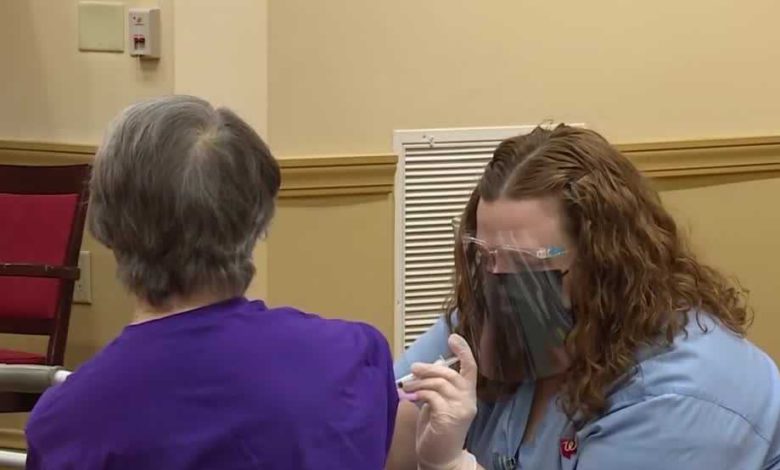

Health experts are stressing the importance of an annual mammogram, even during a pandemic, but warning that undergoing the screening too close to receiving a COVID-19 vaccine could impact what comes up on that scan.A mammogram takes an X-ray picture of the breast to detect early signs of breast cancer."Regular mammograms are the best tests doctors have to find breast cancer early, sometimes up to three years before it can be felt," according to the Centers for Disease Control and Prevention.“You never want to ignore anything that’s going on in your breast. If you feel a lump or have any pain then certainly come and see us,” said Dr. Kelly Cronin, the medical director and section head of breast imaging at Wake Forest Baptist Health in North Carolina. Cronin explained that during a mammogram, the image often captures “up into the underarm area, which is where a lot of lymph nodes will live.” She said after a vaccine, like the COVID-19 vaccine, lymph nodes under the arm can become swollen, mirroring one of the early detection signs screeners look for in mammogram images. Cronin said Wake Forest Baptist Health is encouraging women to keep coming in for the annual exam, but to ensure it is two to four weeks after receiving the second dose of the COVID-19 vaccine to ensure there isn’t unnecessary confusion or worry for patients and their families.Novant Health’s Dr. David Priest said they’re suggesting patients wait four to six weeks between second doses and mammogram appointments.“Lymph nodes tend to swell after vaccination because the immune system is responding to the vaccine,” Priest said. “To prevent confusion or false results on a mammogram, we’re recommending that women should consider scheduling their routine screening mammograms.”Priest stressed the guidance was for regular, screening mammograms. Women with symptoms, with abnormalities or concerns, should not delay, he noted. Priest encouraged women to discuss timing with their providers. Cronin said, at Wake Forest, mammograms are being done with COVID-19 precautions in place. “Getting a routine, annual mammogram is so important,” Cronin said. “If you haven’t had a mammogram in over a year and you’re over 40, certainly come back in and get that scheduled. We’ll get it taken care of safely.”Both medical systems put out the recommendations following the Society of Breast Imaging’s guidance on the matter.
Health experts are stressing the importance of an annual mammogram, even during a pandemic, but warning that undergoing the screening too close to receiving a COVID-19 vaccine could impact what comes up on that scan.
A mammogram takes an X-ray picture of the breast to detect early signs of breast cancer.
"Regular mammograms are the best tests doctors have to find breast cancer early, sometimes up to three years before it can be felt," according to the Centers for Disease Control and Prevention.
“You never want to ignore anything that’s going on in your breast. If you feel a lump or have any pain then certainly come and see us,” said Dr. Kelly Cronin, the medical director and section head of breast imaging at Wake Forest Baptist Health in North Carolina.
Cronin explained that during a mammogram, the image often captures “up into the underarm area, which is where a lot of lymph nodes will live.” She said after a vaccine, like the COVID-19 vaccine, lymph nodes under the arm can become swollen, mirroring one of the early detection signs screeners look for in mammogram images.
Cronin said Wake Forest Baptist Health is encouraging women to keep coming in for the annual exam, but to ensure it is two to four weeks after receiving the second dose of the COVID-19 vaccine to ensure there isn’t unnecessary confusion or worry for patients and their families.
Novant Health’s Dr. David Priest said they’re suggesting patients wait four to six weeks between second doses and mammogram appointments.
“Lymph nodes tend to swell after vaccination because the immune system is responding to the vaccine,” Priest said. “To prevent confusion or false results on a mammogram, we’re recommending that women should consider scheduling their routine screening mammograms.”
Priest stressed the guidance was for regular, screening mammograms. Women with symptoms, with abnormalities or concerns, should not delay, he noted. Priest encouraged women to discuss timing with their providers.
Cronin said, at Wake Forest, mammograms are being done with COVID-19 precautions in place.
“Getting a routine, annual mammogram is so important,” Cronin said. “If you haven’t had a mammogram in over a year and you’re over 40, certainly come back in and get that scheduled. We’ll get it taken care of safely.”
Both medical systems put out the recommendations following the Society of Breast Imaging’s guidance on the matter.
Source link






